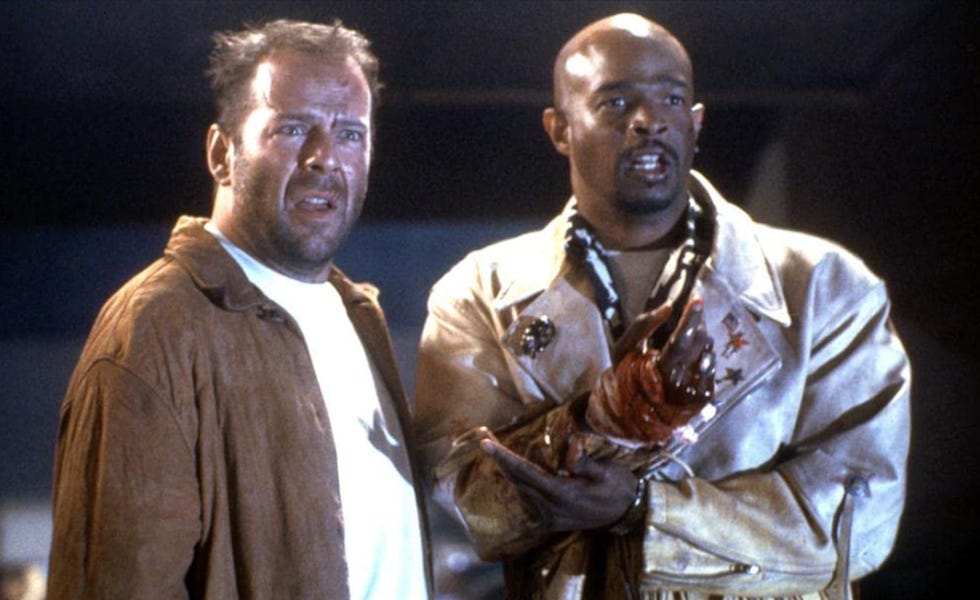“This movie is the future,” Roger Ebert said of The Last Boy Scout in his review at the time. “It assumes the average audience now has no standards except those of the mob.”
He wasn’t wrong, though “the future” looks a lot more like superhero movies than action heroes these days. Maybe like Tom Petty’s “Last DJ” Bruce Willis’s “Last Boy Scout” was only the beginning of the future. After all, even the greatest prognosticators can’t see it all.
That’s neither here nor there. The reason I want to talk about Ebert’s review of The Last Boy Scout is because it is perhaps my favorite TV review of all time—not because it’s the best, or even Ebert’s best, but because it helps me articulate how a critic can—and ought—to balance their subjective taste against objective analysis of a work’s quality.
Ebert hated The Last Boy Scout, but he gave it 3/4 stars. How is this possible? “Watching it,” Ebert wrote, “I felt like some weatherbeaten innocent from an earlier, simpler time. My distaste was irrelevant.”
The film, Ebert argued at the time, is deeply mysoginistic:
The only consistent theme of the film is its hatred of women. The two heroes (Willis and Damon Wayans) have a wife and a girlfriend, respectively, who cheat on them - the wife with Willis’ best friend, the girlfriend by prostituting herself. Both men are at home in this screenplay, which hates women with a particular viciousness; the verbal violence begins by calling them bitches and whores and worse, over and over again, and the message is that a man can only really trust another man. The end of the movie is peculiar in the way it insists on this; the hero, reconciled with his cheating wife, embraces her and whispers vile obscenities into her ear. We are intended to read them as tender. Then he strolls off lovingly with his buddy.
Obviously Ebert felt quite passionately about this. He recoiled from the film’s vulgarity and what he perceived as misogyny and violence toward women. (I should note that it’s been a long time since I’ve seen The Last Boy Scout but I don’t remember it being nearly as bad as he recounts and found it a mostly enjoyable action flick—but again, that’s neither here nor there).
Still, despite his passionate dislike of the movie, 3 out of 4 stars is a positive review. After his damning accounting of the subject matter, Ebert continued:
I am a reporter. I must report not only the film’s willingness to degrade women and children. I must also report the film’s slick, clever professionalism. As I said before, this film works. Despite any objection I may have felt, it plays well with an audience (although some of the people around me seemed disturbed by an extended scene in which Willis and his child curse each other).
The movie has a lot of laughs, its action sequences are thrilling, its surprises are startling, and it shows a real ingenuity in the ways by which it gets Willis into, and out of, trouble.
He has other criticisms of the film beyond its sexism. “The story depends heavily on the device of the Talking Killer,” he wrote at the time, “which I have written about elsewhere; the killer who need only pull the trigger to end the movie, but chooses instead to boast and stall until the hero can somehow outsmart him.” (The Incredibles expands on this quite brilliantly).
And yet he concludes:
“The Last Boy Scout” is a superb example of what it is: a glossy, skillful, cynical, smart, utterly corrupt and vilely misogynistic action thriller. How is the critic to respond? To give it a negative review would be dishonest, because it is such a skillful and well-crafted movie. To be positive is to seem to approve its sickness about women. I’ll give it three stars. As for my thumb, I’ll use it and my forefinger to hold my nose.
This, dearest readers, is such a perfect example of a critic balancing their subjective opinion against their objective assessment of quality that I turn to it regularly, almost as a sacred text. I tried to channel Ebert when I wrote my review of The Last Of Us Part II (despite his distaste of video games) which I felt quite similarly about. That game was a superb example of what it was: A glossy, skillful, cynical, smart, utterly corrupt and vilely misogynistic action thriller. And yes, I do think that the game—lauded by many in the progressive video game scene—was misogynistic, painting its female characters as little more than violent, vengeful and one-dimensional. I titled my review “A Beautiful, Terrible Sequel” and praised its technical achievements while calling the story a “nihilistic path of despair and misery porn.”
Even after all these years writing reviews, looking back at Roger Ebert’s work—most recently, I read his excellent review of Taxi Driver after watching that film for the first time in 20 years, one of his favorite films and something of an antithesis to The Last Boy Scout—reminds me that I have a lot to learn and a long ways to go. It’s humbling. But then I believe it’s good to be humbled from time to time.
I’ll leave you with a quotation from my favorite Belgian detective: “I shall be the most humble person in the world. No one will match Hercule Poirot for his humbility.”





As a fan of Ebert and of "The Last Boy Scout" that one was always tough for me... lol.
I love The Last Boy Scout and I think Ebert is absolutely, objectively right.